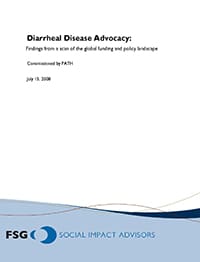Diarrheal disease remains a major killer of children in the developing world. With research commissioned by PATH, FSG explored the landscape of diarrheal disease advocacy to identify gaps, create a shared sense of urgency, and inform a path forward for the diarrheal disease field and the broader global health community.
Top Takeaways
- While diarrheal disease is the second leading killer of children under the age of 5, accounting for approximately 1.6 million deaths annually, policymakers do not prioritize diarrheal disease interventions.
- The success of programs addressing diarrheal disease in the 1980's coupled with increased attention to other diseases such as HIV/AIDS and malaria has resulted in a misperception that the problem of diarrheal disease has been solved.
- Aligning with the shift in the global health community from a vertical, disease focused perspective to a horizontal, systems-level approach, diarrheal disease stakeholders recommend that efforts to increase funding and attention be framed within the context of child survival and the top killers of children.

